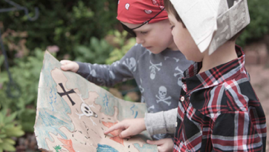The development of language is a big milestone for children. Language is the foundation for all social interactions, having problems to communicate can cause frustration both for you as a parent, but more importantly for your child.
You can make the learning process fun by interacting with them the whole way through, encouraging them as they achieve new words and making the process enjoyable. Here are some simple strategies to boost your little one’s language skills.
Read! Then read it AGAIN and AGAIN and AGAIN!
While reading the same story over and over again might bore you to death it certainly does the opposite for your child. Children need to hear words and sentences lots of times to understand them and learn new words.

The land of make believe
The language and creative skills used to make up and act out these fantasy stories are the same skills that allow children to understand, create, and process written stories.
Show them the right way
Young children often make mistakes. Show them that you understand, rather than asking them to repeat words correctly. Say the word or sentence again correctly for your child. If they say “Look at the dod”, you can say “Yes, it’s a dog”.
Enjoy music together
Young children love music and movement. When they listen to lively songs, like “Old McDonald Had a Farm,” they learn about the world around them and the rhythm of language.

Getting them involved
My beautician’s 3 (almost 4) year old son plays by the salon after school, as I was paying on the EFT machine she was showing him what buttons to press to complete the transaction. While I’m sure other clients might have become impatient, I on the other hand encouraged his efforts, and when he was done gave him a celebratory high five.
Activities like helping mommy cook, or helping daddy rake up the leaves might test your patience to the limits that you eventually want to say, “Just leave it, I’ll do it myself” BUT DON’T these are important activities that enrich your child’s language development.
Just have fun
Use actions, sing, make noises and funny faces. Create elaborate stories with characters, conflict, adventure, and a happy ending. Don’t be shy, being a bit silly helps get their attention and makes them laugh and can encourage language acquisition.
On a more serious note
Treat ear infections thoroughly. Children in schools are more prone to ear infections, which can put them at risk for hearing loss and, consequently, language delays.
If you are worried about your child, talk to people you know and who know your child. If you’re still worried, go with your instinct, GET HELP talk to your GP or a speech and language therapist.
Children who develop strong language and communication skills are more likely to arrive at school ready to learn.They also are less likely to have difficulties learning to read and are more likely to have higher levels of achievement in school.
By Romana Gieselbach, Southdowns College Pre-Praparatory School
We understand that there are many aspects that encompass a Mother, Father or Child and strive toward providing resources and services that accommodates this.
Our content is aimed to inform and educate families on issues starting from pregnancy through to the challenges of the teen-age years.
- Say Hello to the Ultimate Holiday Brunch Bite - December 17, 2025
- Tiny Toons Looniversity Returns: Meet the Voice Behind Plucky and Hamton! - December 12, 2025
- From Pain to Possibility: Panado®’s New Marketing Campaign, Highlights The Joy Of Pain Relief - December 10, 2025





